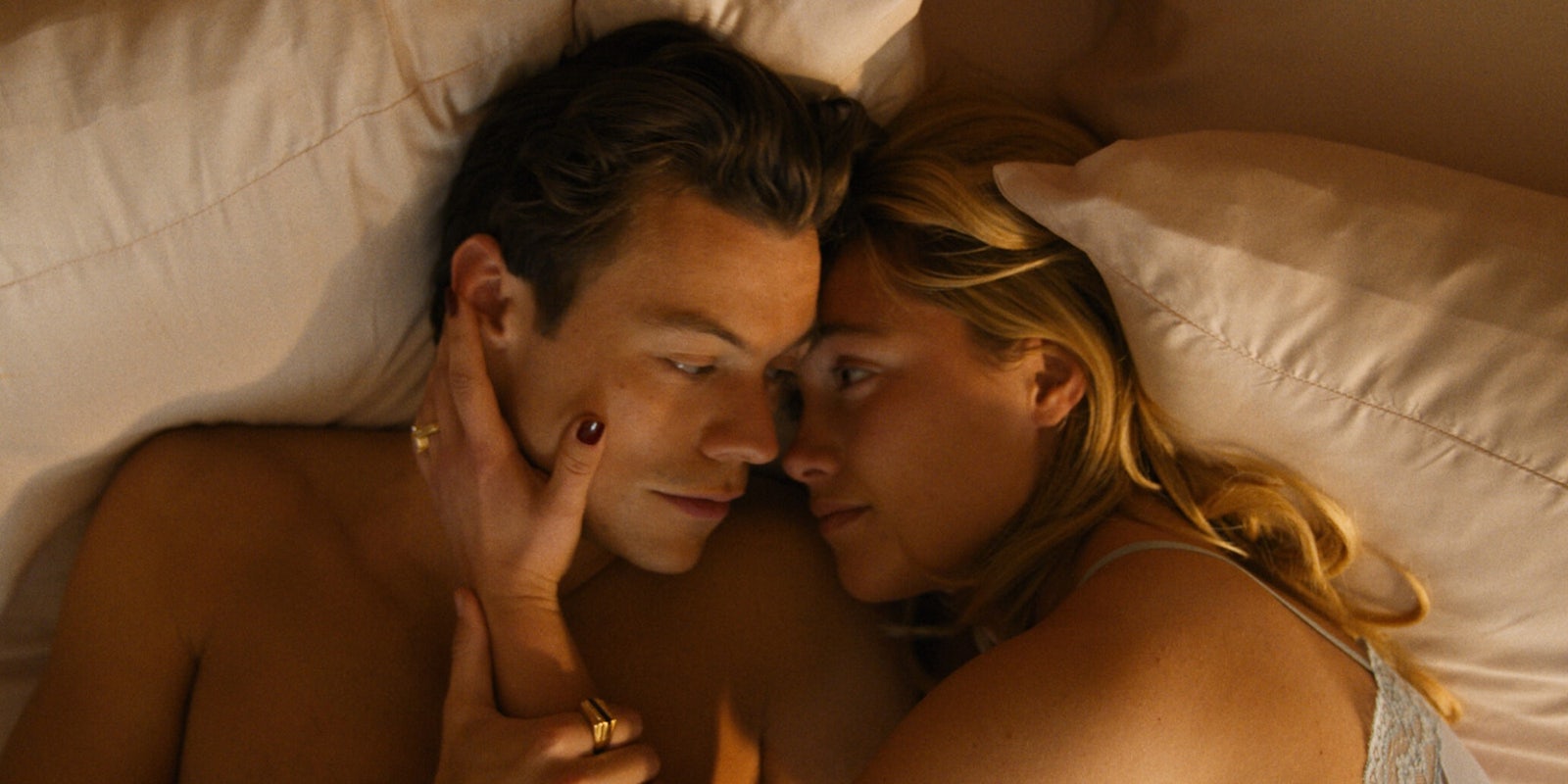Florence Pugh is worth her weight in gold. Headlining an embarrassingly obvious Stepford Wives-alike thriller concept in Don’t Worry Darling, her magnetic performance almost (almost!) keeps the film afloat as we await the inevitable plot-twist.
Overshadowed by real-world scandals, Don’t Worry Darling is a disappointing second feature from Olivia Wilde, whose directorial debut Booksmart was far sharper and more entertaining. For this project, she acquired an original screenplay by Shane and Carey Van Dyke, which was then rewritten by Wilde’s collaborator Katie Silberman. One wonders if this process (which Wilde described as “like adapting a great piece of IP“) made the original idea better or worse, because the final draft is about as deep as a cocktail glass.
Director: Olivia Wilde
Florence Pugh stars as a 1950s housewife in this glossy but ill-conceived psychological thriller. While Pugh gives a powerful performance, the film’s feminist themes are half-baked at best, and Harry Styles doesn’t quite have the acting chops to carry off his role as Pugh’s husband.
Alice (Pugh) and Jack (Harry Styles) live happily in a 1950s company town, socializing with a photogenic coterie of neighbors played by Olivia Wilde, Gemma Chan, Nick Kroll, and others. The women stay home while the men work at a mysterious company known as The Victory Project, vying for the attention of their boss Frank (Chris Pine), who has unmistakable cult-leader vibes. But while Alice and Jack seem blissfully happy, All Is Not As It Seems. Of course.
What happens at the Victory Project? Why aren’t the women allowed to leave town? As Alice begins to question the world around her, Jack and her neighbors try to gaslight her into agreeing that nothing’s wrong.
The trouble is, we’ve seen this idea many times before. In addition to the obvious Stepford Wives comparisons, there are dozens of other movies that use 1950s suburbia as a symbol of sexist oppression. This one says nothing new. Filmmakers were telling more insightful stories about domestic gender roles in the actual 1950s and ’60s—whether we’re talking about straight-up horror (Rosemary’s Baby) or “women’s pictures” about the restrictions of suburban marriage (All That Heaven Allows).

Most viewers will spend the middle section of Don’t Worry Darling waiting for the other shoe to drop. Evidently, some kind of twist is coming, and while I won’t spoil the specifics, the eventual explanation is pretty half-baked. It also puts a weird spin on Wilde’s casting choices, because the presence of Gemma Chan and KiKi Layne makes it clear from the get-go that this isn’t a typical 1950s town. In reality, a neighborhood like this would not be so comfortably desegregated.
Wilde is happy to explore sexism through the lens of affluent suburbia (i.e. being Harry Styles’ sexy housewife) but avoids acknowledging the racial tensions we’d expect in this scenario. This emphasizes the idea of Alice’s life being a specifically White Feminist horror fantasy, with a generalized sort of “toxic masculinity” as the villain in a luxurious, Instagram-ready setting. (See also: Promising Young Woman.)
These nominally-inclusive casting choices paper over the ill-conceived nature of Don’t Worry Darling’s racial politics. Even without going into spoilers, the breakdown of screentime is clear: The main characters (Pugh, Styles, Pine, Wilde) are white, while Layne and Chan play tertiary roles. As the only Black character of any import, Layne’s job is to suffer in the background. She only gets about four lines of dialogue.
With its clichéd premise and glossy production design, Don’t Worry Darling has the vibe of a feature-length music video. It doesn’t help that there’s an obvious skill gap between Pugh and Styles. He’s fine! But “fine” isn’t good enough when none of the characters have much personality on the page. Pugh is delivering a Hitchcockian breakdown while Styles is simply delivering his lines. His accent is also very distracting, meandering between Northern England and a transatlantic drawl. When another character confirmed out loud that Jack is “a Brit,” it was an immense relief to learn he wasn’t meant to be American.
In Lady Macbeth and Midsommar, Florence Pugh honed her skill at playing women pushed to the brink by toxic relationships. Don’t Worry Darling is an appropriate follow-up—or it would be, if the film had anything else going for it. Although Wilde’s vision has some superficial appeal, the lack of substance soon begins to drag, leaving Pugh’s performance as its only real strength.


